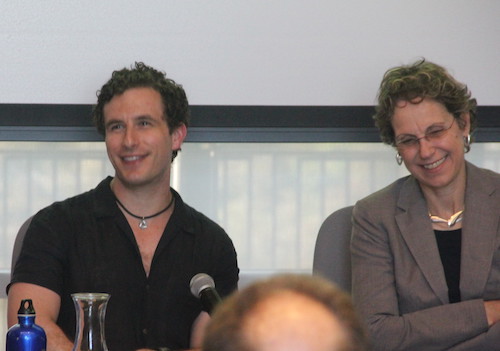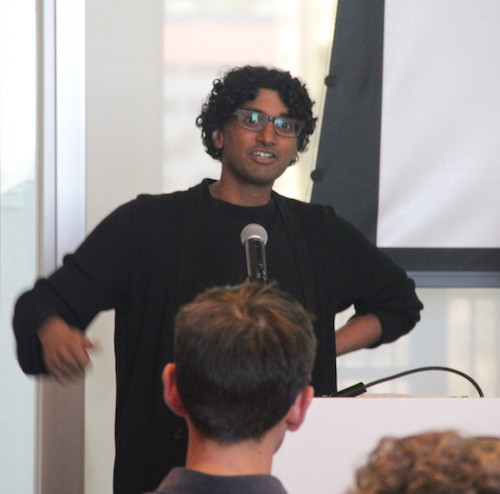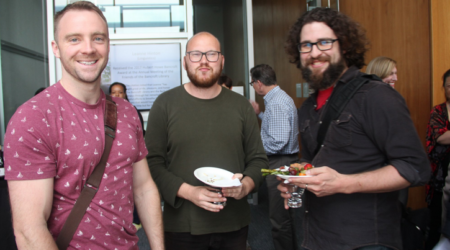“Radical Markets”: A Panel Discussion and Critique with E. Glen Weyl from Social Science Matrix on Vimeo.
On May 11, 2018, Matrix was honored to host a panel discussion featuring E. Glen Weyl, principal researcher at Microsoft and visiting senior research scholar in economics and law at Yale University. The panel focused on Weyl’s book, Radical Markets (co-authored with Eric Posner), which introduces provocative ideas on how to use markets to tame monopoly, lessen inequality, and enhance inclusiveness. This event was presented as part of the Social Science Matrix Solidarity Series.
Weyl began by outlining the basic vision outlined in his book by taking the audience on a “journey of imagination” to a fictional society he called Marketopia. “The distinctive feature of Marketopia,” Weyl explained, “is that all major private property –houses, land, airplanes, factories, public drilling rights, etc. – are continually up for auction to the highest bidder, and whoever is the current highest bidder can possess that asset as long as they a) continue to pay that bid they made in rental payments on an ongoing basis to the commons; and b) that they stand ready so that any time someone else comes and beats their bid, they’ll vacate that property and turn it over to whoever wins.”
 He noted that this concept also would apply to collective decisions, such as what routes buses will take, or “where parks will be located and what they’ll look like,” as such decisions would be based the greatest total willingness to pay. Drawing a comparison to how oil revenues are allocated to members of the public in Norway and Alaska, Weyl explained that, in Marketopia, “the revenue from these transactions is refunded as a social dividend or universal basic income.”
He noted that this concept also would apply to collective decisions, such as what routes buses will take, or “where parks will be located and what they’ll look like,” as such decisions would be based the greatest total willingness to pay. Drawing a comparison to how oil revenues are allocated to members of the public in Norway and Alaska, Weyl explained that, in Marketopia, “the revenue from these transactions is refunded as a social dividend or universal basic income.”
Weyl pointed out that this model represents an extreme example of a market economy—something “way beyond the fever dreams of someone like Adam Smith”—but that the concept is also “a very extreme implementation of the idea of common ownership advocated by [Karl Marx],” because “in Marketopia, the benefits of all assets are equally shared among all people, and everyone by construction has an equal right to conteset for control of those asses using those shared equal benefits, so there is no such thing as the ‘wealthy’ in Marketopia.”
He noted that these ideas in fact are rooted in part in thinking from the late 19th century, including Henry George, as well as Nobel Laureate and William Vickrey. Weyl explained that he and Posner picked up these thinkers’ ideas in developing the five major policy proposals outlined in Radical Markets.
Their first idea, he explained, is a tax on all private property in which everyone would self-assess the value of the property on which the tax was levied, and where the owner would have to stand ready to sell the property at that price.
The second idea is “quadratic voting,” in which every citizen would be allocated an endowment of “voice credits” that they can expend on collective decisions that matter to them. “They could have as many votes as they want, but they’d have to pay from their voice credits the square of the number of votes that they get,” a system that Weyl said would allow minorities to win on issues that were particularly important to them.
 The third proposed policy is a new migration system that would allow every citizen to sponsor one migrant worker at a time to come work in that country, and to allow them to negotiate for a share of the benefits the migrant receives while in that country. The fourth policy is enforcement of anti-trust laws that would “reinvigorate market competion and equality in the economy,” while the fifth is a re-framing of the data that people provide to digital companies as labor for which they should be more fairly compensated.
The third proposed policy is a new migration system that would allow every citizen to sponsor one migrant worker at a time to come work in that country, and to allow them to negotiate for a share of the benefits the migrant receives while in that country. The fourth policy is enforcement of anti-trust laws that would “reinvigorate market competion and equality in the economy,” while the fifth is a re-framing of the data that people provide to digital companies as labor for which they should be more fairly compensated.
Following Weyl’s overview, a panel of discussants provided feedback on the ideas outlined in Radical Markets.
Anat Admati, the George G.C. Parker Professor of Finance and Economics at Stanford’s Graduate School of Business, expressed skepticism that reforming markets would get to the heart of the issues shaping inequality: “It’s implausible to me that inequality is the result of legal and social restrictions incompatible with market economy,” she said. “In fact, market economy is producing some kind of form of market equality combined with policy failures that is producing what we’re seeing today, which is all the distortions that we have. The bottom line is that the government can enable markets, or it can distort them…. Radical markets are not what we need, as much as first and foremost improved governance.”
Emmanuel Saez, Professor of Economics and Director of the Center for Equitable Growth at UC Berkeley, praised Weyl for pointing out the importance of power in economics; Saez noted that the concept of power is a “blind spot” for most economists as it does not sufficiently fit into economic models. “The phenomenon of power is much broader than monopoly and monopsony, and I want to commend the authors for bringing that idea to the fore,” Saez said. “What we need in economics is a good way to model bi-lateral power.”
However, Saez pointed out that the Marketopia model would unfairly punish people for having an emotional attachment to assets, e.g. if they do not want to sell their house because they love it, they would have to pay an exceedingly high tax based on the value at which they would be willing to sell. “If I have developed an asset I really love, their system would be a tax on that love as well,” Saez said. “As a principle of taxation, that would be perceived by many people as unfair.” Saez also noted that the model would be unlikely to reduce inequality, as buyers would have different levels of sophistication and ability to value their assets appropriately.
 Suresh Naidu, who teachers economics, political economy and development at Columbia University, expressed gratitude for Weyl’s book as a provocative infusion of new ideas. “Economics is a better place when ideas like this are put to there,” Naidu said. “It beats arguing over an identification condition.”
Suresh Naidu, who teachers economics, political economy and development at Columbia University, expressed gratitude for Weyl’s book as a provocative infusion of new ideas. “Economics is a better place when ideas like this are put to there,” Naidu said. “It beats arguing over an identification condition.”
He noted, though, that Radical Markets‘ focus on “utilitarian efficiency” assumes that a reduction in equality will follow, but he suggested that those with disproportionate wealth in such a system would continue to have an undue advantage, and in fact would have greater control over others’ assets than ever before. “If you have a lovely dinner party but you have a rich person over and you insult them, they could say, ‘I’m buying your house,'” Naidu said. “That’s a cooked-up example, but when you put more things on markets and you have very skewed distributions, you put a bunch of us at the mercy of the arbitrary whims of the top end of the distribution.”
The final critic, Jeff Gordon, a graduate student in sociology at the University of California, Berkeley, hailed the book’s portrayal of a society where “markets and common ownership can co-exist”—which he said is a perspective that is “rare to hear in polite company”—and he highlighted the concept of quadratic voting as particularly important. But he asked whether the book sufficiently addresses the role of corporations in today’s market economy, and asked whether the Radical Markets model would allow for all the benefits of a market economy, such as the potential for creative disruption. “Is the bigger problem with modern capitalism inefficiency, or inequality?” Gordon asked. “And which problem is the better rallying cry for a political movement which will need to fix either?”
Watch the video above to hear how Weyl responded to the panelists’ comments, as well as to audience questions.
Social Science Matrix would like to extend thanks to all the participants in this event, as well as to our partners, the UC Berkeley Opportunity Lab and the Gilbert Center.


